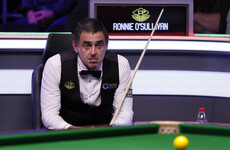Murray Kinsella reports from the Lensbury Hotel
STEPHEN LARKHAM’S MOST famous moment in a Wallabies jersey came in a World Cup semi-final at Twickenham.
Now he’s one of the men attempting to inspire the Australians to another magnificent achievement in the final four of a World Cup at the famous London venue.
Larkham’s sensational 48-metre drop goal in extra time against South Africa in 1999 – shifting the Wallabies 24-21 in front – was Larkham’s first one ever in a Test match. Indeed, it was so uncharacteristic that it sparked a humorous ‘Don’t Kick It‘ advert by the ARU following their victory in the final against France.
Better known for his creative playmaking as a Wallabies out-half, the drop goal ended up being Larkham’s iconic moment in that World Cup Cup success.
What will his 2015 masterpiece prove to be?
Already there is a contender. Larkham is now the attack coach for the Wallabies, brought in by Michael Cheika earlier this year to add his intelligence and understanding of the game.
The second Bernard Foley try against England in the pool stages of this tournament – with Kurtley Beale and Foley bouncing back against the grain – had Larkham’s fingerprints all over it.
“If you can see a weakness, or not so much a weakness but an avenue you can profit from, that gives you confidence heading into a game and he’s very good at this,” says centre Matt Giteau of Larkham’s ability to identify opportunities for the Wallabies in attack.
Larkham earned his coaching stripes with the Brumbies, first as an assistant before accepting the role of head coach last year.
Larkham played in the 2003 World Cup alongside Giteau, the creative pair both featuring in the final defeat to England. Giteau was a youthful replacement for the Wallabies at that point, before starring in the 2007 tournament when Larkham was 33.
Now the Toulon midfielder finds himself working under Larkham.
“He’s been very good,” says Giteau. “He’s not funny, he’s tried a few jokes which don’t work. I think as far as our structure and plays and dissecting the opposition go, he’s very smart. Even when he played he was good. I knew this was a role he’d be good with.
He used to be very quiet as a player but as a coach he speaks a lot, he gets his messages across well and as I said the way he dissects teams, it’s a real pleasure to watch. The style he wants us to play is really pleasurable to play.”
Chieka gets the plaudits as head coach of course, but one of his true triumphs has been adding Larkham to his coaching staff. It might be the difference against Argentina on Sunday.
Wallabies back row Scott Fardy, who has been working with Larkham at the Brumbies since 2012, says he has seen the 41-year-old grow as a coaching influence in that time.
“I’ve worked closely with Steve, it’s always a pleasure, ” says Fardy. “He’s a legend of the game. Everyday being coached by him, it’s been a great experience.
“As coach, he was still rather young in those early days at Super Rugby level. He’s only been head coach for a year but now he’s worked alongside guys like Nathan Grey and Cheika. Obviously, it’s only going to benefit him in the future.
“He’s done a great job already at Super Rugby level. He’s always been, from what I hear, almost a coach in his playing days, so he’s been fantastic.”
11 of Australia’s 17 tries in Pool A came against Uruguay, but three against Fiji, three against England and five against Scotland last weekend also showed that the Wallabies are capable of breaking down strong defensive sides.
Larkham’s influence has been deeply apparent in the thoughtful nature of the Wallabies attack strategy, which includes a search for width, more direct running from the likes of Tevita Kuridrani, and also mauling play from the forward pack.
There have been tweaks to the attacking mindset of a man who liked to run and pass from everywhere on the pitch as a player, but no dimming of his ability to pick out the opposition’s weak points and send his team in that direction.
If Cheika’s men do break down the Argentinians on Sunday and move on to a fourth World Cup final, Larkham will have been a crucial figure.
- This article was updated at 09.14 to correct ‘Argentina’ to ‘Uruguay’ in the 19th paragraph.













I can’t decide if Black Mary is the best or worst name for a donkey ever.